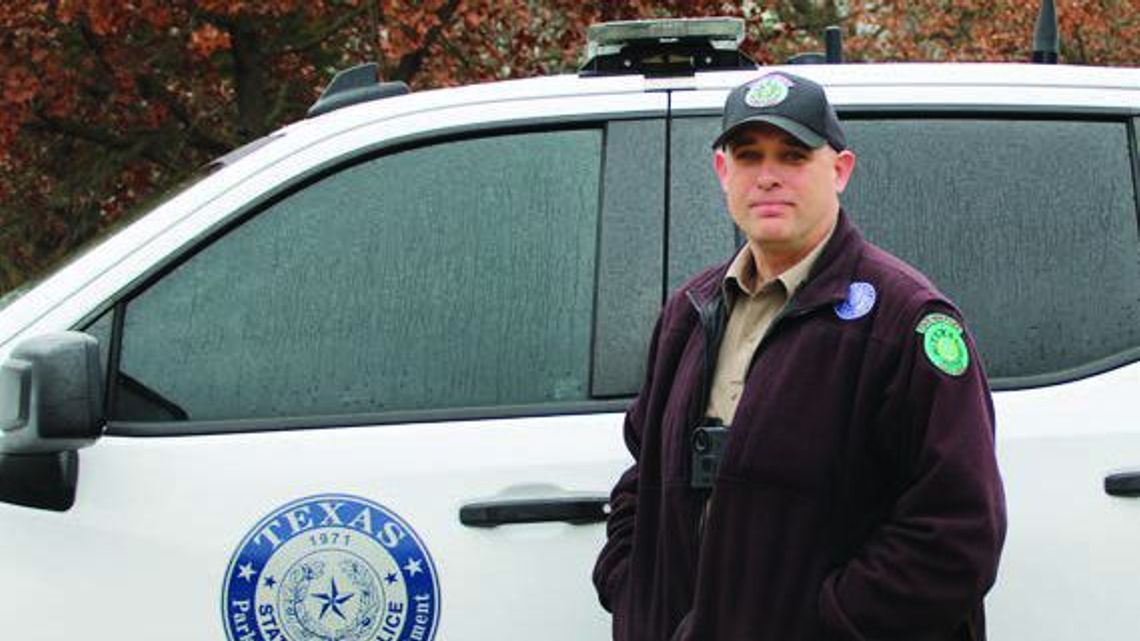New to his position at Isle du Bois but far from new to the lake, Sgt. Eric Carleton is a 15-year veteran with the Texas Parks and Wildlife.
Though he came up around the parks’ system thanks to his mother being an employee, Carleton found his career after making the best of an unexpected cancelation.
“I spent a lot of summers out at McKinney Falls State Park, … [but] my goal was to work for DPS,” Carleton said. “My internship the summer I was supposed to do it fell through, and I ended up able to do an internship with Parks and Wildlife Park Police. That’s how I learned more about this side of law enforcement.”
He got his recent promotion to sergeant after successfully evacuating the campgrounds around the Johnson Branch Unit just before the tornado struck in May.
“I was on the swim beach patrolling and had just checked the weather app about an hour before, and the radar was showing the cell going north of us,” he said. “We were just going to get the edge of it. I get a call from my captain out of Tyler, Texas, ‘Eric, you’re under a tornado warning, did you know that?’ I was like, ‘No, I checked about an hour ago, and there were no watches or warnings.’” He’d just finished a preliminary sweep warning campers when the watch turned into a warning.
Turning back to make a more urgent set of rounds, he found the campers had taken his first warning seriously as cars lined both sides of the park road and visitors headed for shelter in the restrooms.
“I was driving up towards the day use area,” Carleton said. “… As I got between the restroom and program parking lots, I felt the wind push my truck sideways like I was on ice. Then, I had flying debris hit my truck,” he said explaining this was his sign to take cover himself. “If I’m dead, who is going to know the park better than me to help people.”
Carleton shared shelter with several other campers including a couple of dog owners.
“I remember there were people with dogs in there saying, ‘We’re so sorry. We know pets aren’t supposed to be in here,’” Carleton said. “But we don’t care about that; we care about people and pets’ lives. We want everyone to be safe.”
Despite numerous fallen trees and damage to the park, the people walked away from the incident unscathed.
“We were lucky we had no injuries and no deaths,” Carleton said. “I didn’t realize the impact I had in notifying everyone until we started getting Facebook posts and people coming up to headquarters the next day.”
He explained he hadn’t really considered the impact he’d made during that first sweep with the PA until later when guests returned to show pictures of the tents they or their children would have been sleeping in crushed under fallen trees.
Carleton explained that, outside of those crisis situations, parks law enforcement is very different from municipal law enforcement.
“The majority of our contacts are voluntary compliance contacts,” Carleton said. “We walk a thin line in keeping people safe and doing our job, but there is a revenue process. We want people to keep coming back, don’t want to run off our customers, so we do a lot of voluntary compliance, which is basically educating people the first time they make the violation. If they do it again, that’s on them.”
He followed with stats, saying “about 80-something percent of the stats we post every month are going to be voluntary compliance stuff and the rest citations.”
Another key part of the job is less policing and more stewarding, but unlike other park personnel, who steward the land, it’s up to park police to steward the people.
“One of my first few contacts was a guy that was signing his divorce papers the next day,” Carleton said. “He came out to the lake to the spot his wife and kids always camped at, and it was weird because he didn’t have a tent set up.”
He continued. “I got out of the vehicle just asking him how his day was, making small talk and he looked at me and said, ‘I know what you’re doing; I’m a retired police officer,’” Carleton said. “We got to talking and he broke down and told me about what was going on. He said, ‘I’m just here reflecting, going through some tough stuff, but I don’t need anyone.’ There is not much we can do at that point, but it didn’t stop me from driving by that campsite quite a bit during the shift just to make sure he was OK.”
That was one of several stories he shared.
“There is no telling what you’re going to deal with from day to day,” Carleton said. “There could be someone go- ing through a mental health crisis, depression. We’ve got suicides out here. Some I’ve stopped, and some I’ve gotten to too late. It’s just the nature of working out in the state park.”
Though he was initially bound for DPS, Carleton said he found early on the thing to love about this unique form of law enforcement.
“When I got into this job, just during my summer internship, I rode with different officers at different parks ranging from smaller visitations to mega parks, and one thing I got from all those experiences is this job is freedom when it comes to law enforcement,” Carleton said.
He elaborated saying at the parks officers aren’t driven by stats or quotas.
“If what you do supports the mission statement of this agency, and everything you do is ethical and right and you’re out there making a difference, we’re not going to tell you that you have to have certain stats,” Carleton said.
Carleton explained that freedom allows officers to develop specialties naturally.
“If you get good in a certain area, let’s say drug cases, it gets to be a sixth sense, an intuition,” Carleton said. “I’ve got an officer at IDB. He’s a great drug officer, … and he’s developed that over time because he’s afforded the freedom to cultivate that.”
He explained for him the intuition is in fishing violations.
“I probably lead the region for fishing citations, contacts and cases,” Carleton said. “It’s something normally wardens handle, but I just happened to spend most of my career on Texoma, Ray Roberts and popular fishing areas. There was a lot of opportunity to branch into that and get good at it.”
Like most park employees, when he leaves the park, it’s often just to go home for some gear to turn back around again and return to nature.
“I’ve got two dogs at home, German shepherds, named Rocky and Bullwinkle, and I have a cat named Marty,” Carleton said. “They’re like my kids [and] keep me on my toes. And I like to kayak fish. It’s something I do in my spare time. I like fishing by myself, and you can’t fit another person on a kayak like you can on a boat.”

















